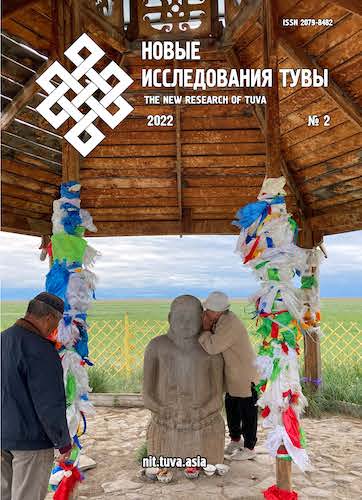Ethno-linguistic situation as a factor in the social well-being of the Republics of Russia: the cases of Tuva, Bashkortostan and Kalmykia
DOI:
https://doi.org/10.25178/nit.2022.2.5Keywords:
linguistic situation; social well-being; regional language; native language; Tuva; Bashkortostan; Kalmykia; Tuvans; Bashkirs; KalmyksAbstract
The article deals with the influence some aspects of ethnolinguistic situation in Russia’s constituent republics have over the social well-being of local population. Opinion polls held in Bashkortostan, Tuva and Kalmykia between December 2020 to January 2022 are an important measuring tool of social well-being in the region. Respondents’ assessments of protection and development of regional languages, experience of discrimination against their native and/or regional language by members of other ethnicities, as well as of understanding the importance of protecting native languages and cultures, are all important contributing factors to the general feeling of social well-being.
The article traces the correlation between what the respondents think of the conditions of learning and protecting the regional language of the republic and their opinion on the general quality of life in the republic as compared to other constituent regions of Russia. Quality of living gets a more positive assessment if respondents believe that learning and protecting the regional language have improved over the last 10 years. Respondents from Tuva who think that quality of living in the republic is higher than anywhere else in Russia, tend to value the protection of ethnic culture and language in the region higher. In other regions, however, the two opinions are not directly correlated. Those respondents who tend to undervalue their “own” regional and/or native tongue show no prevailing trends in assessing life in the region.
Bashkirs from Bashkortostan, Russians in Tuva and Kalmyks in Kalmykia, as polls reveal, have more experience of disrespect for their regional and/or native language than any other ethnic group in the three republics. The reasons are, however, region-specific. In Bashkortostan, this is due to disagreements on the use of official languages and a number of other social and political events in the region. In Tuva, the reason lies in the small number of Russians among the region’s population. In Kalmykia, the problem has been influenced by the overall linguistic situation in the region and the decrease in the number of Kalmyks who can speak the Kalmyk language.
References
Arefiev, A. L., Bakhtikireeva, U. M. and Sinyachkin, V. P. (2021) Bilingualism in language education in secondary schools of the Republic of Tuva. New Research of Tuva, no. 1, pp. 255–272. (In Russ.). DOI: https://www.doi.org/10.25178/nit.2021.1.14
Arutiunova, E. M. (2018) Etnoiazykovye problemy i perspektivy v obrazovatel'noi sfere rossiiskikh respublik (na primere Bashkortostana) [Ethno-linguistic problems and prospects in the educational sphere of the Russian republics: the case of Bashkortostan]. Sotsiologicheskie issledovaniia, no. 4 (408), pp. 25–35. (In Russ.). DOI: https://www.doi.org/10.7868/S0132162518040037
Arutyunova, E. M. (2019) Yazykovoi konflikt v raznykh izmereniiakh: keisy Tatarstana i Bashkortostana [Language conflict in various dimensions: The cases of Tatarstan and Bashkortostan]. Sociological Journal, vol. 25, no. 1, pp. 98–120. (In Russ.). DOI: https://www.doi.org/10.19181/socjour.2018.25.1.6281
Aiupova, L. L. and Salikhova, E. A. (2007) Rol' iazykovoi kompetentsii i tsennostnykh orientatsii individa pri opisanii iazykovoi situatsii (issledovaniia podderzhany grantom «RGNF Ural» № 06-04-84403 A/U) [The role of language competence and value orientations of an individual in describing a language situation (research supported by the grant “RGNF Ural” № 06-04-84403 A/Y)]. Vestnik VEGU, no. 29–30, pp. 14–23. (In Russ.).
Baranova, V. V. (2009) Yazykovaia situatsiia v Kalmykii: sotsiolingvisticheskii ocherk [The linguistic situation in Kalmykia: a sociolinguistic essay]. Acta Linguistica Petropolitana, vol. 5, no. 2, pp. 22–41. (In Russ.).
Baranova, V. V. (2021) «Kakaia rech' mozhet idti ob aktsente, esli rech' idet o sokhranenii iazyka?»: otnoshenie k nepolnoi iazykovoi kompetentsii [“how can we even talk about accents when it comes to preserving a language?”: attitudes towards partial linguistic competence]. Antropologicheskij forum, no. 49, pp. 11–29. (In Russ.). DOI: https://www.doi.org/10.31250/1815-8870-2021-17-49-11-29
Bitkeeva, A. N. (2019) Kalmytskii iazyk: proshloe i nastoiashchee [Kalmyk language: past and present]. In: Perspektivy i vyzovy iazykovoi politiki i iazykovoi situatsii v Krymu [Prospects and challenges of language policy and language situation in Crimea]. International Round Table (Moscow, 05-06 November 2019): Reports and messages / ed. by M. Vingender, A. N. Bitkeeva and E. V. Khilkhanova. Moscow, Institut iazykoznaniia RAN. 100 p. Pp. 72–81. (In Russ.).
Borgoiakova, T. G. and Bitkeeva, A. N. (2020) Tuvinskii iazyk v pravovom i funktsional'nom izmerenii [Tuvan language in legal and functional aspect]. New Research of Tuva, no. 1, pp. 50–61. (In Russ.). DOI: https://www.doi.org/10.25178/nit.2020.1.4
Denisova, G. S., Denisova, A. V. and Namrueva, L. V. (2016) Etnokul'turnoe obrazovanie v Respublike Kalmykiia: sushchestvuet li ugroza formirovaniiu grazhdanskoi identichnosti [Ethno-cultural education in the republic of Kalmykia: is civil identity in danger?]. Vestnik Kalmytskogo instituta gumanitarnykh issledovanii RAN, vol. 9, no. 2 (24), pp. 176–186. (In Russ.).
Iskuzhina, N. G. (2017) Yazykovaia situatsiia v Respublike Bashkortostan na sovremennom etape [The language situation in the Republic of Bashkortostan at the contemporary stage]. Politicheskaia lingvistika, no. 5 (65), pp. 194–199. (In Russ.).
Kovanova, E. S., Badmaeva, N. V., Udaev, R. A. and Alekseev, S. G. (2019) Etnokul'turnaia bezopasnost' i problemy sokhraneniia iazyka v Kalmykii i Buriatii [Ethnocultural security and problems of language preservation in Kalmykia and Buryatia]. Oriental Studies, vol. 12, no. 6 (46), pp. 1096–1106. (In Russ.). DOI: https://www.doi.org/10.22162/2619-0990-2019-46-6-1096-1106
Mikhal'chenko, V. Yu. (2015) Yazykovaia situatsiia i iazykovaia politika v sovremennoi Rossii [Language situation and language policy in contemporary Russia]. In: Yazykovaia situatsiia v Evrope nachala XXI veka [The language situation in Europe at the beginning of the XXI century]: a collection of reviews / ed. by N. N. Troshina. Moscow, Institute of Scientific Information on Social Sciences of the Russian Academy of Sciences. 179 p. Pp. 14–31. (In Russ.).
Namrueva, L. V. (2018) Nuzhen li uchashcheisia molodezhi Kalmykii kalmytskii iazyk (po materialam sotsiologicheskikh issledovanii 2015 i 2017 gg.) [Do the students of Kalmykia need Kalmyk language (according to sociological surveys of 2015 and 2017)?]. New Research of Tuva, no. 1, pp. 143–152. (In Russ.). DOI: https://www.doi.org/10.25178/nit.2018.1.12
Safin, F. G. and Khaliulina, A. I. (2015) Rol' russkogo iazyka v formirovanii obshcherossiiskoi grazhdanskoi identichnosti v polietnichnom regione (na primere Bashkortostana) [The role of the Russian language in the formation of the All-Russian civic identity in a multiethnic region (on the example of Bashkortostan)]. Sotsiologicheskie issledovaniia, no. 11 (379), pp. 90–96. (In Russ.).
Sereedar, N. Ch. (2018) Tuvinskii iazyk kak sredstvo obshcheniia tuvintsev: problemy i perspektivy [Tuvan language as means of communication among Tuvans: Problems and prospects]. New Research of Tuva, no. 1, pp. 4–19. (In Russ.). DOI: https://www.doi.org/10.25178/nit.2018.1.1
Suseeva, D. A. (2018) Kalmytskii iazyk i iazykovaia situatsiia v Kalmykii: proshloe i nastoiashchee [Kalmyk language and language situation in Kalmykia: past and present]. Vestnik Kalmytskogo universiteta, no. 1 (37), pp. 105–120. (In Russ.).
Tishkov, V. A. (2019) Iazykovaia situatsiia i iazykovaia politika v Rossii (reviziia kategorii i praktik) [Language situation and language policy in Russia: Revisiting categories and practices)]. Polis. Political Studies, no. 3, pp. 127–144. (In Russ.). DOI: https://www.doi.org/10.17976/jpps/2019.03.08
Khabibullina, A. R. (2010) Sfery mezhetnicheskogo vzaimodeistviia v Respublike Bashkortostan na sovremennom etape [Spheres of interethnic interaction in the Republic of Bashkortostan at the contemporary stage]. Vestnik Cheliabinskogo gosudarstvennogo universiteta, no. 15 (196), pp. 103–111. (In Russ.).
Khairullina, R. Kh. and Fatkullina, F. G. (2020) Rodnye i inostrannye iazyki: ravnovesie ili protivostoianie? [Native and foreign languages: balance or confrontation?]. Issues of ethnopolitics, no. 2, pp. 10–17. (In Russ.). DOI: https://www.doi.org/10.28995/2658-7041-2020-2-10-17
Khisamitdinova, F. G. and Mukhtarov, T. G. (2016) Funktsionirovanie iazykov v Respublike Bashkortostan: problemy razvitiia bashkirskogo iazyka kak gosudarstvennogo [Functioning of languages in the Republic of Bashkortostan: problems of development of the Bashkir as the state language]. Problemy vostokovedeniia, no. 1 (71), pp. 70–75. (In Russ.).
Tsybenova, Ch. S. (2019) Sotsial'naia kharakteristika iazykovoi situatsii v Respublike Tyva [Language situation in the Republic of Tyva: Social characteristics]. Oriental Studies, vol. 12, no. 3 (43), pp. 460–477. (In Russ.). DOI: https://www.doi.org/10.22162/2619-0990-2019-43-3-460-477
Yazyk i identichnost': antropologicheskoe issledovanie situatsii v Rossii [Language and identity: an anthropological study of the situation in Russia] (2021) / M. Yu. Martynova, V. A. Tishkov, V. V. Stepanov et al. Moscow, Institut etnologii i antropologii im. N. N. Miklukho-Maklaia RAN. 620 p. (In Russ.).
Published
How to Cite
For citation:
Turakayev M. S. Etnoiazykovaia situatsiia kak faktor sotsial’nogo samochuvstviia regiona v natsional’nykh respublikakh Rossii (na primere Tuvy, Bashkortostana i Kalmykii) [Ethno-linguistic situation as a factor in the social well-being of the Republics of Russia: the cases of Tuva, Bashkortostan and Kalmykia)]. New Research of Tuva, 2022, no. 2, pp. 70-84. (In Russ.). DOI: https://www.doi.org/10.25178/nit.2022.2.5
Issue
Section

This work is licensed under a Creative Commons Attribution-NonCommercial 4.0 International License.

Author(s) license holder(s) grant rights for their work to the journal (grantee of a license) under the simple non-exclusive open license in accordance with Art. 1286.1 «Open license for a research work, work of literature or fine arts», Civil Code of the Russian Federation.
New Research of Tuva publishes articles under the Creative Commons Attribution-NonCommercial license (CC BY-NC).
Since it is an open license, author(s) reserve the right to upload the article to their institutional repository, submit it to another journal (if it allows republications), or republish it on their own website (in full, or in part).
However, several conditions apply here:
a) The republished version must always contain the name(s) and affiliation(s) of the author(s), the original title and the hyperlink to the original version on the New Research of Tuva website;
b) It must be in open access, free of charge, and no category of readers must be in any way whatsoever advantaged over general readership.
c) should the contribution be submitted elsewhere by its author(s) without substantial modification (30% or more of original text unchanged), the body of the article should contain a disclaimer that the original version was published in New Research of Tuva (with a link to the respective page)
The CC-BY-NC is a non-revocable license which applies worldwide and lasts for the duration of the work’s copyright.









